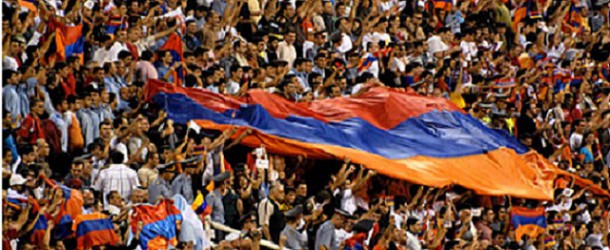It is common knowledge that a standoff in geopolitical, economic, ideological and cultural fields between the proponents of a unipolar world and those aspiring to build a multipolar one is aggravating and becoming more overt. The key players in this showdown are the Western nations and institutions encompassing the Euro-Atlantic space, led by the U.S., while on the other side, there are BRICS nations (Brazil, Russia, India, China and South Africa), with Russia playing more pronounced role, and other forces refusing to give in to current world order. This rift is also evident in the relations between the citizens and public institutions of the opposing parties.
Therefore, in light of the exacerbating West-Russia confrontation, relations between the Western and Russian branches of the Armenian diaspora have become complicated. It has to be noted that diaspora in the West, being better structured and financially solid, is engaged in a bitter rivalry with most populous (some two million people) diaspora in Russia over leveraging Armenia’s political and economic life. In this regard, Armenia’s society appears to be fragmented, as one part of the population favors Westernization and European integration, while the others support conservatism and alignment with Russia.
First of all, it has to be emphasized that some 8-10 million people-strong Armenian diaspora, scattered through different continents, can be divided into three large groups – Western, Middle Eastern and post-Soviet. Stemming from location, each of these groups possesses different mindset, values and culture. These differences are distinctive in their performance and with respect to their attitude towards Armenia. On the surface, all of them are bound solely with such common causes as the recognition of the so-called genocide, legitimizing Armenian occupation of the Azerbaijani territories and struggle for strengthening Armenia’s statehood. The point is, different branches of the Armenian diaspora have divergent views on these issues, particularly, on the ways of ensuring Armenia’s development.
Armenians of the EU countries, U.S., Canada, Australia and New Zealand, especially descendants of the initial wave of Armenian migrants, that is to say those who are native to Western environment, are radically different from the post-Soviet space Armenians, in terms of culture, outlook and liberal values. Western Armenians are more preoccupied with such issues as human rights, democratic freedoms and gender equality. They see embracing Western, liberal values as the path towards Armenia’s growth and modernization. This thought is rejected by the conservatives and mostly by the Armenians of Russia.
The issue that complicates the matters further is that despite the donations of over $170 million by the Western diaspora organizations since 1991, the formers have failed to establish a political and social environment of their choice in Armenia. Apparent effort of the Armenia’s Western diaspora to change the political climate in the country was the endorsement of Raffi Ovanesyan, native of California, during the presidential elections in 2014. Nonetheless, outcome of the elections was stark contrast with the expectations of the diaspora.
Recent deepening of pro-Russia policy of the Armenian leadership, rejection of the associated membership with the European Union and orientation towards the Customs Union has aggravated the diaspora’s ideological rivalry over Armenia. There is growing intolerance towards members of the diaspora from the West that are in the country to advocate gender quality and human rights. One of the examples could be the clash of values that happened during a court hearing on the subject of domestic violence held in one of Armenia’s conservative provinces on 9 May 2014. Leader of the Armenian-Russian Union Robert Aharonyan, head of Yerevan-based Women’s Support Center, American Maro Matosyan and the director of Women’s Resource Center, Canadian Lara Aharonyan were also in attendance.
In the course of the hearing pro-Russian activist Robert Aharonyan lashed out at the Canadian and American women’s rights activists for condemning the violence against women and accused them of promoting ”European values”. ”A man has the right to slap his wife” he claimed, and suggested that those ”who don’t know local traditions” should leave Armenia (Armenia: Pro-Russia Activists Attack Diaspora Members For Promoting ”European Values” / Eurasia.net, 28.05.2014).
Apparently, efforts of some diaspora members to promote Western outlook encounter criticism and pressure on the part of the conservatives and opponents of European integration. Lack of harsh reaction to the threats, embodied by the likes of Aharonyan, against the diaspora Armenians signify vested interest of the authorities on this matter because pro-Western institutions target none other than the government of Armenia for human rights violation.
Interestingly, actions of the pro-Russia Armenians concur with the position of certain political circles in the country. Reportedly, in one of the interviews Russian Ambassador to Armenia Ivan Volinkin urged the ”neutralization” of the Western-sponsored NGO’s, alleging they were hampering development of bilateral ties between the countries (Armenia: Pro-Russia Activists Attack Diaspora Members For Promoting ”European Values” / Eurasia.net, 28.05.2014).
Nonetheless, it would be inaccurate to attribute this collision in Armenia to mere cultural and ideological differences. Financial and corporate interests also play their part. This is manifested in the rivalry between Armenia’s home-grown oligarchs and the diaspora business community. As a result of the frictions, Western diaspora businesses, particularly from the U.S., were eventually pushed out of the country. However, the country’s economy is still in dire need of foreign investments. This is why John Heffern, U.S. Ambassador to Armenia, is trying to encourage the Armenian-Americans to invest in Armenia (Джон Хефферн: Мы предложим варианты для Армении / Lragir.am, 17.07.2014).
Nevertheless, according to Armenian experts, given the impact of Russia factor, Armenian diaspora in that country would outweigh the Armenian diaspora of the West (Диктующим становится армянская диаспора России / ru.1in.am, 26.07.2014). Of course this cannot please those in the West that have invested generously in the development of Armenia and continue heavy lobbying activity. Presumably, against the backdrop of West-Russia confrontation, the Armenians would do their best to camouflage the intra-diaspora frictions, while rivalry over influence on Armenia further exacerbates.
Hulya MAMMADLI


























































Comments are closed.